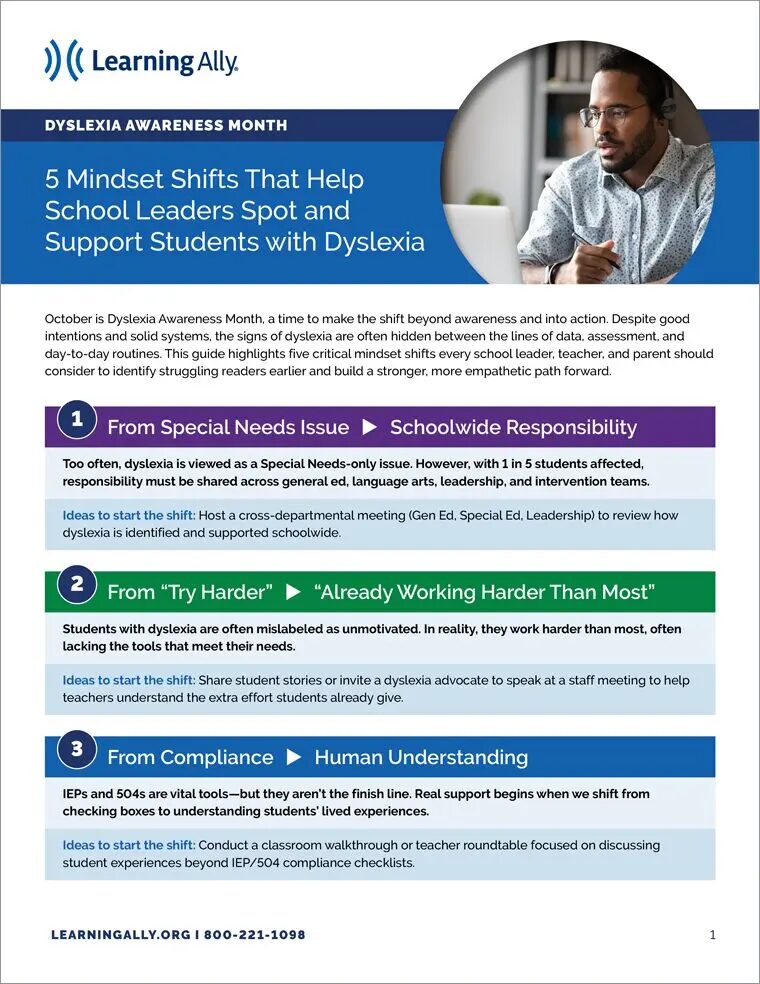
October is National Dyslexia Awareness Month, first established by the U.S. Senate in 2002 to raise awareness about one of the most common yet misunderstood learning differences. Today, more than two decades later, schools and communities continue to use this month as an opportunity to educate, advocate, and act on behalf of the 1 in 5 students with dyslexia—or about 15-20%—who have dyslexia or a language-based learning disability (Dyslexia Center of Utah).
At Learning Ally, we’ve been on this journey for more than 75 years—helping schools and families understand the real challenges of dyslexia and, more importantly, how to address them. We know that dyslexia is not a reflection of ability or effort. It’s a difference that requires understanding, the right tools, and proactive support.
5 Key Mindset Shifts to Support Students with Dyslexia
This Dyslexia Awareness Month, we’re inviting educators to go beyond awareness to change outcomes for students. What makes the difference is when school leaders and teachers shift their mindset:
- From seeing dyslexia as an isolated issue to making it a shared responsibility across the school
- From assuming students need to “try harder” to recognizing how hard they’re already working
- From focusing only on compliance to truly understanding student experiences
- From waiting and watching to acting early and explicitly
- From general awareness to taking immediate, empathetic action
These shifts are small in theory but powerful in practice. When implemented consistently, they help struggling readers feel seen, supported, and equipped to succeed.

Why Audiobooks Are a Powerful Accommodation for Students with Dyslexia
Children with dyslexia often require more than encouragement—they need accommodations that allow them to fully participate in class. Audiobooks are one of the most effective tools for doing just that.
- Research shows that regular use of audiobooks improves reading accuracy, reduces anxiety, and increases motivation for students with dyslexia. In one five-month study, adolescents who used audiobooks demonstrated stronger school performance and psychosocial adjustment (PubMed).
- Audiobooks also help struggling readers access grade-level content without being limited by decoding difficulties. Literacy practitioners note that audiobooks allow students to focus on meaning, comprehension, and vocabulary growth by reducing the cognitive load of word recognition (Reading Partners).
- Studies of “reading while listening”—where students follow along with text while hearing narration—show that participants often demonstrate gains in fluency and comprehension (Dyslexic Advantage).
- Learning Ally’s own data supports this: students using our Audiobook Solution doubled their reading growth in just 50 days, giving struggling readers the chance to catch up with their peers (Learning Ally).
When audiobooks are paired with early intervention and empathetic teaching, students gain not just stronger literacy skills, but also the confidence and motivation to see themselves as readers.
Learn from the Dyslexia Experts
To help your school put these shifts into practice, we’ve created a new resource: 5 Mindset Shifts That Help School Leaders Spot and Support Students with Dyslexia

👉 Download the 5 Mindset Shifts Resource
You’ll find actionable steps for school leaders, classroom teachers, and families to use right away.
Continue your learning through:
- Dyslexia Simulations — Experience what your students with dyslexia experience
- Spotlight on Dyslexia Deeper Dive Series — Register to hear from national literacy advocates and practitioners
Why Dyslexia Awareness Month Is the Right Time to Take Action
National Dyslexia Awareness Month is about more than recognition—it’s about responsibility. The earlier we act, the more potential we preserve. By making intentional shifts in mindset and practice, and by using evidence-based tools like audiobooks, we can help ensure that every student—no matter how they learn—feels confident and capable.
Together, we can make this more than just a month of awareness. We can make it a turning point for struggling readers.